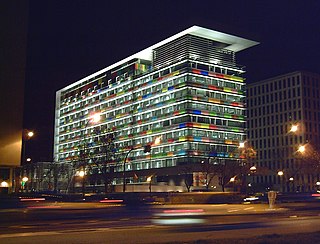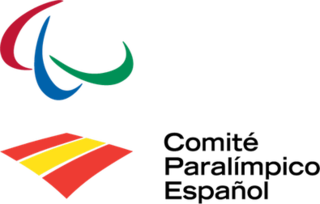Related Research Articles

The Instituto Nacional de Estadística is the official agency in Spain that collects statistics about demography, economy, and Spanish society. It is an autonomous organization responsible for overall coordination of statistical services of the General State Administration in monitoring, control and supervision of technical procedures. Every 10 years, this organization conducts a national census. Through the official website one can follow all the updates of different fields of study.
José Antonio Expósito Piñero is a Paralympic athlete from Spain.

Spanish Paralympic Committee is a Spanish non-profit sport organisation founded in 1995, that oversees five national disability sport federations. The organisation has a Secretary General and a President. Since 2005, they have been supported by Plan ADO. In 2000, the CPE was involved in a cheating scandal at the 2000 Summer Paralympics.
José Martínez Morote is a Paralympic athlete from Spain competing mainly in category T20 track and field events. He has an intellectual disability, attended school in Cruz de Mayo and serves as a mentor to local track and field athletes. While he originally started sport playing football, he switched to athletics by the age of 16 at the suggestion of a teacher who noticed his speed with the ball. He has gone on to compete at the 2007 World Games, the 2011 IPC World Athletics Championships in Christchurch, New Zealand and the 2012 Summer Paralympics. Martínez has held at least two athletics scholarships to continue his participation in the sport.
Manuel Ángel Martín Pérez is a Spanish boccia player who is also known as Manolo Martín. He has cerebral palsy and is a BC2 type athlete.
Verónica Pamiés Morera is a Spanish boccia player, who has represented the country internationally at the Paralympic Games.
Francisco Javier Beltrán Manero is a Spanish boccia player, who has represented the country internationally at the Paralympic Games.
José María Dueso Villar is a Spanish boccia player, who has represented the country internationally at the Paralympic Games.
José Manuel Prado Prado is a Spanish boccia player, who has represented the country internationally at the Paralympic Games.
José Manuel Rodríguez Vázquez is a Spanish boccia player, who has represented the country internationally at the Paralympic Games. Vazquez won a gold medal in the 2004 Summer Paralympics in Athens.
Sandra Peña Cortés is a Spanish boccia player who has represented the country internationally at the Paralympic Games after finishing first in a National competition in 2011.
Spanish Federation of Sports for the Blind is the national governing body for blind sport in Spain. It is one of five disability organizations that are part of the Spanish Paralympic Committee. Prior to its creation in 1995, blind sport in Spain was governed by Spanish Sports Federation for the Physically Disabled and Organización Nacional de Ciegos Españoles (ONCE).

Spanish Sports Federation for Persons with Physical Disabilities is one of five disability sport organizations aligned with the Spanish Paralympic Committee that works towards support disability sport in Spain, and in this case specifically for people with physical disabilities.
Spanish Federation of Sportspeople with Intellectual Disabilities is one of five disability sport organizations that deals with sport on the national level. It focuses on intellectual disabilities, one of two in the country to do so nationally. It has a high performance focus.
Spanish Federation of Sports for the Deaf is the national governing body for deaf sports in Spain. Based in Madrid and created in 1993, they are one of five disability sport organizations that are members of the Spanish Paralympic Committee.
Spanish Federation of Sportspeople with the Cerebral Palsy is the national sports federation for people with cerebral palsy. It is composed of regional federations. It supports a number of sports.
Disabled sports in Spain started in the 1910s with the emergence of deaf sport. Blind sport began in the 1930s. Sport for people with physical disabilities began in the 1950s, and was primarily rehabilitative. The first major organization for disabled sports was created in 1968 at the direction of then president of the Spanish Olympic Committee Juan Antonio Samaranch. Spain competed at its first Paralympic Games that same year. ONCE became the official organization for organizing Spanish representation in international blind sport competitions in 1986. Spanish sport was restructured because of changes in law during the early 1990s, resulting in the creation of four new disability sport organizations and the Spanish Paralympic Committee. During the 1990s and 2000s, funding opportunities for disabled sports improved.
Princess Victoria Elisabeth von Hohenlohe-Langenburg, 20th Duchess of Medinaceli, GE is a Spanish noblewoman. Holding 43 officially recognised titles in the Spanish nobility, she is the most titled aristocrat in the world, as well as 10 times a Grandee of Spain.

The disability flag, overcoming flag or Flag of the Rights of Persons with Disabilities is a flag that represents people who have disabilities. It was created by the Valencian dancer Eros Recio in 2017 and then presented to the United Nations. The flag is meant for general use, particularly at disability-centered events. It has been used at the International Day of Persons with Disabilities.
María Fernanda Castro Maya is a Mexican self-advocate disability rights activist.
References
- 1 2 Instituto Nacional de Estadística "Encuesta de Discapacidad, Autonomía personal y situaciones de Dependencia (EDAD)" Survey on Disability, Personal Autonomy and Dependency Situations 2008.
- ↑ "¿Cuántas personas con discapacidad hay en España? | CERMI. Comité español de representantes de personas con discapacidad". www.cermi.es. Retrieved 2021-05-20.
- ↑ "BOE.es - BOE-A-2006-21990 Ley 39/2006, de 14 de diciembre, de Promoción de la Autonomía Personal y Atención a las personas en situación de dependencia". www.boe.es (in Spanish). Retrieved 23 October 2021.
- ↑ "BOLETÍN OFICIAL DEL ESTADO" (PDF). Boletín Oficial del Estado (in Spanish) (289): 95635–95673. 3 December 2013.
- ↑ "United Nations Treaty Collection". treaties.un.org. Retrieved 23 October 2021.
- ↑ "Country Profile: Spain". Disability Arts International. Retrieved 23 October 2021.